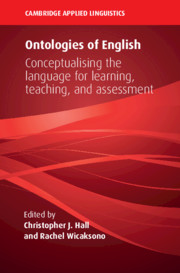Book contents
- Ontologies of English
- The Cambridge Applied Linguistics Series
- Ontologies of English
- Copyright page
- Dedication
- Contents
- Figures
- Tables
- Contributors
- Series Editors’ Preface
- Acknowledgements
- Transcription Conventions
- Part I Introduction
- Part II English in/for L2 Learning and Teaching
- 3 English in the Real World
- 4 From Constructions to Social Action
- 5 Native and Non-native Speakers of English in TESOL
- Part III English in Schools
- Part IV Assessing English
- Part V English in Lingua Franca Contexts
- Part VI English and Social Practice
- Part VII Commentary and Conclusions
- Index
- References
3 - English in the Real World
Norms and the Ontology of English(es)
from Part II - English in/for L2 Learning and Teaching
Published online by Cambridge University Press: 24 December 2019
- Ontologies of English
- The Cambridge Applied Linguistics Series
- Ontologies of English
- Copyright page
- Dedication
- Contents
- Figures
- Tables
- Contributors
- Series Editors’ Preface
- Acknowledgements
- Transcription Conventions
- Part I Introduction
- Part II English in/for L2 Learning and Teaching
- 3 English in the Real World
- 4 From Constructions to Social Action
- 5 Native and Non-native Speakers of English in TESOL
- Part III English in Schools
- Part IV Assessing English
- Part V English in Lingua Franca Contexts
- Part VI English and Social Practice
- Part VII Commentary and Conclusions
- Index
- References
Summary
Ontological inquiry into the nature of language has been somewhat marginal since the “linguistic turn” in philosophy (cf. Rorty, 1967), i.e. for about seventy-five years. Although the shift of emphasis from the more concrete objects of investigation to their formal properties has since been reversed, this change in zeitgeist did not give rise to a new wave of ontological rethinking. That was perhaps mainly due to the impact of social constructionism, which was just as sceptical of ontology as logical positivism, albeit from a different perspective: Rather than looking for ‘hard’ properties of true reality in formal structure, social constructionists basically aimed at deconstructing all descriptions that claimed to represent true reality. This book is a welcome sign that things may be changing.
Keywords
- Type
- Chapter
- Information
- Ontologies of EnglishConceptualising the Language for Learning, Teaching, and Assessment, pp. 39 - 58Publisher: Cambridge University PressPrint publication year: 2020



